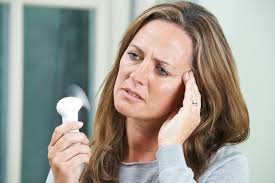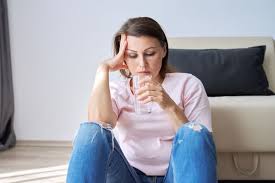Managing Menopause Symptoms: Tips for Easing Discomfort
Menopause occurs when a woman has not gotten her period for 1 year. This usually occurs from the mid 40’s to 50 years of age. Menopause is a natural stage in a woman’s life that marks the end of her reproductive years. It occurs when the ovaries stop producing estrogen and progesterone, the hormones responsible for menstruation. Symptoms of menopause may include hot flashes, night sweats, vaginal dryness, sleep disturbances, mood swings, and more. Menopause can also bring on bone loss and an increased risk of heart disease, stroke, and osteoporosis. With the right lifestyle and medical interventions, women can manage their menopause symptoms and enjoy a healthy, active life. Please keep reading for details on the following topics:
Causes of menopause
Symptoms of menopause
Diagnosing menopause
Medications used to treat menopause
Tips to a healthy lifestyle during menopause
When to seek urgent medical care

CAUSES OF MENOPAUSE
Menopause is a natural part of the aging process for women, typically occurring in their late 40s to early 50s. It is the permanent end of menstrual cycles and is caused by a decrease in the production of certain hormones in the body, particularly estrogen and progesterone. This decrease in hormone levels can result in a variety of symptoms, ranging from hot flashes and night sweats to mood swings and vaginal dryness. Understanding the causes of menopause can help individuals better manage their symptoms and prepare for the transition.
Changes with the hormones
Changes with the reproductive system- aged egg supply
Use of a medical procedure to prevent a woman from getting a period
Removal of the ovaries
Chemo or radiation therapy
SYMPTOMS OF MENOPAUSE

Difficulty sleeping (insomnia)
Dryness to the vagina
Heart palpitations
Dry and thin skin
TIPS TO A HEALTHY LIFESTYLE DURING MENOPAUSE

As women enter menopause, their bodies experience a range of physical and emotional changes. To ensure that you stay healthy and active during and after menopause, it is important to make positive lifestyle choices. Here are some tips to living a healthy lifestyle during and after menopause:
Exercise regularly. Engaging in cardiovascular and strength training exercises can help reduce the symptoms of menopause and keep your body strong and healthy. Getting regular exercise to you manage the weight
Eat a balanced diet. Eating a healthy and balanced diet can help improve your overall health, as well as reduce your risk of developing chronic diseases. Consuming a healthy amount of calcium and vitamin D in the diet helps to strengthen the bones
Get enough sleep. Getting adequate sleep is essential for maintaining a healthy lifestyle. Aim for at least seven to eight hours of sleep each night.
Reduce stress. Stress can have a negative impact on your health, so it’s important to take steps to reduce it. Consider participating in activities such as yoga, meditation, and deep breathing
Limiting caffeine, alcohol, and stress helps with sleep
Avoid smoking.
Join a support group comprising of women going through similar situations
Perform Kegel exercise to improve bladder control
Dress in comfortable clothes, and maintaining the surroundings cool to manage hot flashes
Drink plenty water to keep the body cool, to manage hot flashes
Use a vaginal lubricant to help with vaginal dryness
By following these tips, you can maintain a healthy lifestyle during and after menopause
HOW MENOPAUSE IS DIAGNOSED

Menopause is a natural biological process that all women experience as they age. During this time, a woman’s body will begin to produce fewer hormones, leading to a variety of physical, emotional, and mental changes. Diagnosing menopause can be challenging since its symptoms can be similar to those of other health issues. It is important to understand the signs and symptoms of menopause in order to accurately diagnose it and seek the right treatment. Tests conducted include:
A pregnancy test to find out if the woman is pregnant
A follicle-stimulating hormone (FSH): The level elevates in the perimenopausal period and is at its highest when menopause begins
A thyroid-stimulating hormone test: Confirms whether the symptoms are caused by an issue with the thyroid
MEDICATIONS USED TO TREAT MENOPAUSE
Menopause is a natural phase of life for women, but it can also bring physical and emotional changes that can be difficult to manage. Medication can be a useful tool to help reduce symptoms of menopause and improve overall quality of life. From hormone replacement therapy to medications designed to target specific symptoms, there are a variety of options available to help women manage their menopause-related symptoms. It is important to discuss the risks and benefits of each medication with a healthcare provider before starting any treatment. Other medications include:
Birth control pills to regulate menstrual bleeding and relieve symptoms until menopause
Progestin pills and the levonorgestrel IUD to reduce heavy, irregular menstrual periods
Low-dose vaginal estrogen (cream, tablet, or ring) to reduces vaginal dryness
Hormone therapy (HT) in pill, patch, vaginal ring, gel, spray, or cream form to treat menopause symptoms
Estrogen therapy (ET) to prevent symptoms that come with menopause
Testosterone with estrogen to treat menopausal symptoms that don’t improve with estrogen therapy
Antidepressants to lower the number and severity of hot flashes
Clonidine, to reduce the number and severity of hot flashes
Gabapentin (Neurontin) to reduce the number and severity of hot flashes
Ospemifene (Osphena) to reduce vaginal changes that can cause sex to be painful
Black cohosh (such as Remifemin) to or relieve menopause symptoms.
Meditation and relaxation
Soy to improve menopause symptoms
Yoga to reduce stress

WHEN TO SEEK URGENT MEDICAL CARE
Menopause can be a difficult time for many women, but it is important to recognize when seeking urgent medical care is necessary. During menopause, women may experience a variety of physical and emotional symptoms, such as hot flashes, night sweats, irregular periods, and mood swings. While these symptoms are common, it is important to be aware of when to seek medical attention. Urgent care may be needed if you experience any of the following:
Severe abdominal pain
Very heavy and prolonged bleeding
Bleeding between menstrual periods
Recurrence of bleeding after more than 6 months of no period
Severe symptoms which affect sleeping and daily life activities
Pain and dryness to the vagina not correcting with treatment
Pain and burning on urination
If any of these symptoms occur, it is important to contact your healthcare provider right away
Disclaimer: The information provided in this content is for general informational purposes only. It is not intended as medical or healthcare advice, diagnosis, or treatment. Always seek the advice of a qualified healthcare professional with any questions you may have regarding a medical condition or healthcare decisions.

